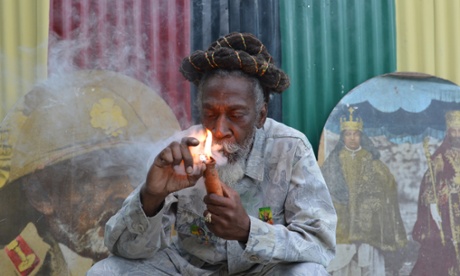Fears of international sanctions have faded now that US states and other countries have made similar moves

Jamaica has drafted legislation to decriminalise marijuana, the island’s justice minister said on Tuesday.
Mark Golding told reporters that MPs should make possession of two ounces (57 grams) or less a petty offence before the end of 2014. He also expects decriminalisation for religious purposes to be authorised by then, allowing Rastafarians to ritually smoke marijuana, which they consider a “holy herb”, without fear of arrest.
The drug, although pervasive, has been prohibited on the Caribbean island for a century.
Golding said it would take longer to agree on more complex changes to Jamaica’s Dangerous Drugs Act needed to spur a medical marijuana and cannabis research sector. He said Jamaica, where scientists developed a cannabis-derived medication to treat glaucoma decades ago, was “well-positioned to be a forerunner” in efforts to research therapeutic uses of the plant.
Golding stressed the government was committed to battling drug traffickers. He said keeping marijuana away from children, the international black market and organised crime would be a top priority.
Previous efforts to decriminalise marijuana failed to advance because Jamaican officials feared they would violate international treaties and bring sanctions from Washington. But those concerns have eased now that a number of nations and some US states have relaxed marijuana laws.
Golding said the regulatory framework needed for a medical marijuana and scientific research industry in Jamaica was still being debated. Setting maximum limits on pot cultivation was not anticipated, he said, but the government wanted to ensure that small farmers “are not excluded and it does not just become something exclusively for major capital-intensive investors”.
